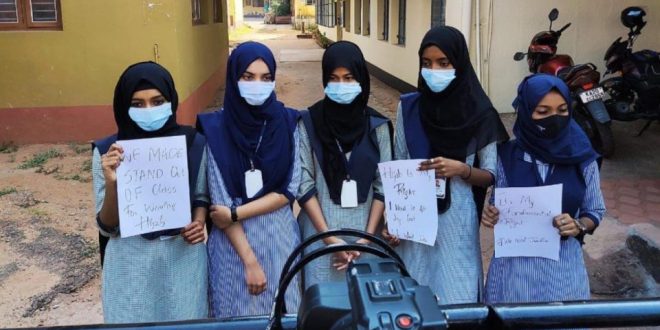Muslim women students in Karnataka, India, were not only actively prevented from accessing their right to education, but also bore the brunt of a climate of hate, hostility. This denial of the right to education of Muslim women is part of a larger politics of the attempt to erase Muslim identity from the public space.
The hijab ban in the State deprived several Muslim girls of their constitutional right to education, expression, dignity and non-discrimination, reads ‘Closing the Gates to Education, Violations of Rights of Muslim Women Students in Karnataka,’ a report released by the People’s Union for Civil Liberties (PUCL) Karnataka.
1,010 hijab-wearing girls dropped out of PU colleges
The PUCL study notes that the state government’s response in the monsoon session of the Karnataka Legislative Assembly revealed that a total of 1,010 hijab-wearing girls dropped out of PU colleges “because of the hijab ban and other reasons as well”.
The PUCL said the government has failed to fulfill its obligation to uphold Article 41 of the Constitution (effective provision for securing the right to education).
The PUCL also found that some faced suspensions and disciplinary action because of organising protests against the imposed ban. Many students who were forced to drop out or collect their Transfer Certificates before the end of the academic year, applied for transfers to minority institutes. Several students were forced to drop out of their studies altogether, due to inaccessibility to alternative paths towards higher education.
Girls PU College enforced restriction on Muslim girls
On 31st December, 2021, Government Girls PU College, Udupi imposed a sudden restriction on the hijab inside classrooms. The college enforced this rest. The college enforced this restriction in the absence of any rule, resolution or guideline.
15th March, 2022 The High Court of Karnataka passed a final order upholding the Government Order dated 05.02.2022 and thereby, allowed for restriction.
On January 9, a report was published by People’s Union for Civil Liberties (PUCL) -Karnataka, which had undertaken a study titled as “Closing the Gate to Education: Violations of Rights of Muslim women students” to investigate the impact of the imposed ban on the students and examine the role of authorities, administrative officials and police officials.
“Through conversations with students as well as authorities, and an analysis of events that transpired, it becomes visibly clear that Muslim women students were not only actively prevented from accessing their right to education, but also bore the brunt of a climate of hate, hostility and misinformation. Students have faced humiliation and harassment in their own classrooms at the hands of their faculty, college administration and classmates. The report documents how vigilante groups of Hindutva organisations carried out a vilification campaign against.
Report: Judgment by Karnataka High Court on hijab ban has’nt immediate effect
The report argued that the judgment by the Karnataka High Court “did not include, in its ambit, a directive to any educational institution to impose a hijab ban with immediate effect.” It added that as the judgment and the interim order came at the time of end-of-year examinations, it had far reaching consequences.
“Despite there being no compulsion or directive to impose a ban, educational institutions across Karnataka, at one stroke, prohibited the hijab. With complete disregard to protocols and due process and the rights of Muslim women students, schools, PU colleges and degree colleges imposed the sweeping ban,” the report said.
Further, the report recommended to the Department of Collegiate Education and Department of Public Instruction to issue a directive which clarifies that the judgment by the Karnataka High Court does not mandate a ban to all schools and colleges and make sure that the wrong imposition of a blanket hijab ban does not take place in educational institutions.
Female Muslim students felt an enormous shock
The study conducted by PUCL, Karnataka documents the voice of the affected students and cull out their concerns and experiences during the ban on Hijab which is presently continuing.
While talking about the ban, the female Muslim students felt an enormous shock when they got to know that some of their classmates and even friends had joined the bandwagon to oppose the Hijab.
Irresponsible interpretation by the Media
The report also discussed media’s wilful misinterpretation of the High Court Interim Order demanding a blanket ‘hijab ban’. After the High Court of Karnataka passed the interim order, Kannada TV channels took it upon themselves to decide on their own that this was applicable to all Muslim students and teachers in schools and colleges.
“Throughout the coverage mentioned in the above section, reporters were seen making a false interpretation of the Interim order of the High Court date 11.02.2022 in WP 2347/2022 to indicate a complete ban on hijab. The reporters claimed that as per the said order there is a ban on hijab all over the state in educational institutions when this was far from the truth,” reads the report.
The study was conducted by the PUCL in five Karnataka districts – Hassan, Dakshina Kannada, Udupi, Shimoga, and Raichur. The PUCL alleged that Hindutva organisations carried out a vilification campaign against hijab-wearing students and the inaction of the government and the police gave implicit encouragement to such fundamentalist forces.
However, the report does not throw light on the purported role of banned organisations like the Campus Front of India (CFI) and the Popular Front of India (PFI) on the hijab issue.
 صراط عشق صراط عشق
صراط عشق صراط عشق




